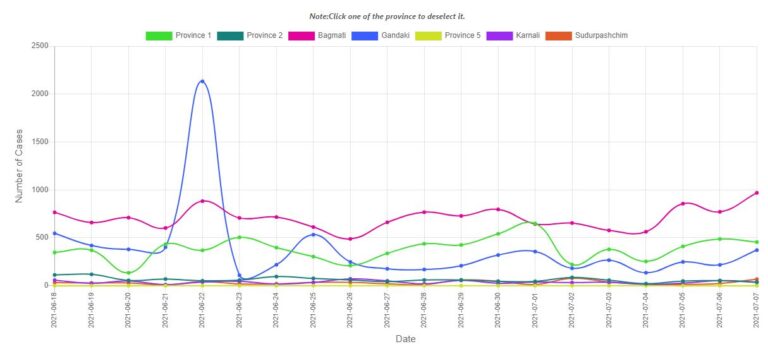
The number of people getting infected with COVID-19 has been on the rise in Nepal of late.
Public health experts have expressed concern over the daily rise in COVID-19 infections after the cases being in decline for the past few weeks.
According to the data at Ministry of Health and Population (MoHP), as many as 9,483 people had tested positive for COVID-19 on May 11, 2021 when the second wave was at its peak.
On that day, 21,316 samples were tested. Thus, the infection rate stood at 44.49 percent, which was the highest during the second wave.
Since then, the number has been steadily declining, and on July 4, only 1,603 new cases were reported.
This number was the lowest daily count after the peak of the second wave.
But the number of new coronavirus cases has been steadily rising for the past three days.
As many as 2,622 new active COVID-19 cases were added on July 5; 2,634 cases were confirmed on July 6 and 2,979 on July 7, including those who tested positive in antigen and PCR tests.
The government has imposed prohibitory orders in the Kathmandu Valley since April 29 after the second wave of the deadly virus hit the country hard.
The prohibitory orders, however, have been relaxed to an extent in the recent weeks after daily new cases plummeted.
According to transmissible disease specialist, Dr Janak Koirala, the second wave of COVID-19 is not yet over in Nepal and the country is still at risk.
He added that daily new cases had started to rise since the prohibitory orders were relaxed amid the ongoing risk and the lack of adequate vaccines.
“Public negligence in following health saftey protocols is the main reason for the increase in daily new infections,” said Koirala.
If daily new COVID-19 cases increase to 8,000 to 9,000 again, it can be termed as third wave, Koirala said.
He added that a new variant other than Delta might also be detected during the inevitable third wave in Nepal.
Another specialist, Dr Prabhat Adhikari said the recent increase in new infections was a continuation of the second wave.
“The Delta variant is very contagious. In the last few days, public activity has also increased, which may have increased the risk of infection,” he said.
Spokesperson of MoHP Dr Krishna Poudel, during a press briefing, said that the rate of new COVID-19 cases had increased across the nation yet again.
“The infection rate had plummeted to less than 25 percent in the past few weeks, but today the infection rate has reached 26.5 percent,” Poudel said on Wednesday.
He argued that the contagion might have increased due to the relaxation of the prohibitory orders in several districts.
“The risk of infection still remains. Let’s not ignore health safety protocols even if the prohibitory orders are relaxed,” Poudel said.
According to Poudel, nine districts still have than 500 active cases. He added that Karnali and Gandaki were at high risk, with the infection rate at 50 percent in Karnali and 39.5 percent in Gandaki.






